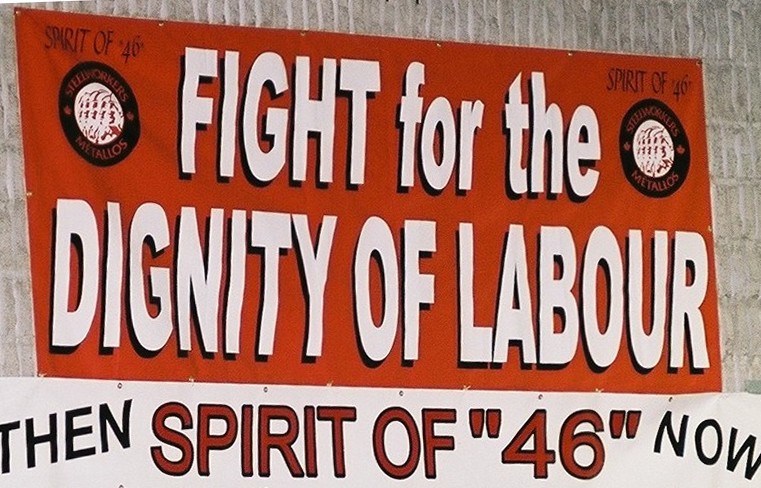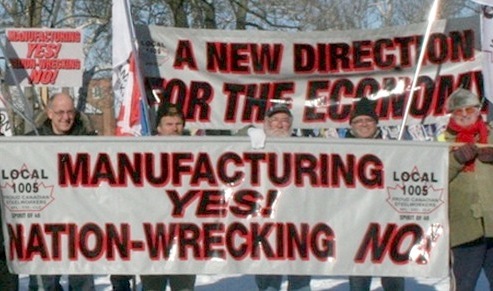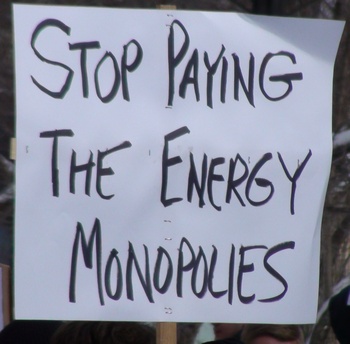Workers
Discuss
Bedrock
Plan
Sponsor
Agreement to Purchase
Stelco
• Steelworkers Stand Firm in Defence of
Rights
• Rally --
Stand Up for Jobs, Pensions and Benefits
Need for a New
Direction for the Economy
• Canada's Economic Model -- Part One
Workers Discuss Bedrock Plan Sponsor
Agreement to Purchase Stelco
Steelworkers Stand Firm in Defence of Rights
Stelco steelworkers, retirees and their supporters held
an
important discussion in Hamilton during the first week of the
New Year. Concern is great amongst steelworkers that the attacks
against them are expanding. Speaking to the threats, many
reiterated their determination to defend their rights and the rights of
all in the face of the all-sided attacks of the oligarchs
who are plotting against them. They spoke passionately that their
security depends on their fight in defence of the rights of
all.

Steelworkers and retirees
face an onslaught from the U.S. oligarchs
and a Canadian state and mass media they do not control.
Workers can control their own organizations, thinking, voice and
actions with analysis in their defence. In the struggle to defend
rights, the central issue is to activate the human factor/social
consciousness in a planned organized way. If focus is turned away
from those things the working class can control, then energy and time
are wasted in futile attempts to influence the oligarchs and
their state to change their behaviour rather than concentrating on
mobilizing and organizing the working class to defend its
rights with actions with analysis, to become a powerful organized
conscious force that refuses to be deprived of its rights.
The
Hamilton
working
class
declares with one voice: Not to honour the
previously negotiated agreements for wages, benefits and pensions in
exchange for Stelco steelworkers' capacity to work is wrong! Not to
honour commitments on Stelco employment and production levels necessary
to meet the company's obligations and sustain the Canadian economy is
wrong!
The
oligarchs
and
their
imperialist state can scream and whine and use
their mass media to spread their anti-worker dogma all they like, it
will not change the objective reality in the twenty-first century that
rights must be upheld. The working class refuses to accept violations
of its rights and dignity, and is strengthening its
organizations, unity and voice for a determined battle.
The Oligarchs Have Not and Will Not Change Their Ways
The oligarchs and their imperialist state are convinced
that the only way to satisfy their aim for empire-building and seizure
of the social wealth workers produce is to deprive the working class of
what belongs to it by right. The oligarchs will never give up their
anti-worker convictions because their class privilege and empires are
based on and governed by their anti-worker ideology. The
working class can only force them to come to some agreement for
equilibrium that tempers their anti-social aim and requires them
to recognize that workers will only produce social wealth within an
atmosphere of equilibrium in the class struggle where their
rights and dignity are upheld. This equilibrium can only be secured if
the working class shows in practice that it has independent
institutions and thinking, and a conscious determination to defend its
rights without fail.

Steelworkers discussed that
the oligarchs and their state since approving the Bedrock Plan Sponsor
Agreement (PSA) on
December 15, 2016 still refuse to meet their obligations for
post-employment benefits and pensions or pay municipal taxes. Even
though Stelco has amassed $250 million from its truncated operations,
it continues to use the bankrupt Companies' Creditors
Arrangement Act (CCAA) as a state-organized weapon to deny
workers their rights and to attack the Canadian steel communities
and economy. Stelco steelworkers are producing enormous value but the
oligarchs in control refuse to meet their obligations with
or without the PSA.
The PSA is a monstrous hoax to throw sand in the eyes
of the
gullible. The new oligarchs replacing the old oligarchs have no
intention of meeting the social obligations arising from the
decades-old agreements made with steelworkers in exchange for their
capacity to work. Steelworkers denounced the charade to bring in yet
another gang of U.S. oligarchs to suck Stelco's social
wealth back to New York and Miami. Even with reduced production caused
by U.S. Steel wrecking and escaping with the Canadian order
book, Stelco steelworkers are producing considerable value. The
so-called bankrupt Stelco has not needed any outside funds for
operations -- not even from the Debtors-In-Possession. Stelco does not
need Bedrock, steelworkers emphasized, it needs a new
direction.
Others denounced Stelco President Mike McQuade's
statement that the
Bedrock PSA would allow Stelco "to emerge from creditor
protection as a viable low cost producer." Such an abusive statement
comes from the lips of someone who views the actual producers
of value as a "cost." McQuade's PSA "savings" will come at the expense
of the workers who produce the value in the first place and from
reneging on the company's social obligations not only to the workers
and retirees but to the overall economy, community and environment.
The Bedrock PSA brings
nothing to Hamilton. It should be rejected outright. It hands
over social wealth to U.S. Steel for a fraudulent loan to itself while
refusing to pay the $150 million legitimate loan from the
Ontario government. It does not hold U.S. Steel to account for its
refusal to honour its original Stelco purchase agreement to
maintain certain production and employment levels nor does it render
judgment and demand restitution for its subsequent lockouts
and wrecking.

It does not hold U.S. Steel
to account for its promise to
make the pension plans whole by the end of 2015. Instead,
the PSA intends to sever the production of steel value from existing
pension and benefit agreements by removing them from the
balance sheet, which means wiping the oligarchs' hands clean of all old
and new defined pensions and benefit obligations. Past and
present steelworkers are to be cast adrift without the pensions and
benefits they fought for and won following the historic strike
struggle of 1946 and strengthening of USW Local 1005.
The PSA does not
hold U.S. Steel or any company or oligarchs responsible for
environmental remediation of polluted lands but instead pawns the duty
off on the provincial and municipal governments and
retirees in an arrangement that sounds eerily similar to buying
swampland in Florida from crooked real estate agents.
The PSA does
not guarantee Stelco employment or production levels but instead makes
clear that the Bedrock oligarchs are only interested in
ridding Stelco of its social obligations, driving down wages and
benefits to turn the company into McQuade's anti-worker dream of
"a low cost producer" and flipping the remains for a big score. The
Bedrock Controlling Fund has no interest in building Canada's
steelmaking capacity and may even idle both steelworks in a lockout for
as long as it takes to force concessions on steelworkers
in the style of the now infamous MANA German imperialists. The PSA does
not even guarantee to pay back outstanding municipal
taxes.
Far from the PSA contributing anything to Hamilton, with
increased steel production and revenue at both Hamilton and Lake Erie
Steelworks in an independent Stelco, the company does not
need oligarchs at all. They are simply a drag on revenue and production
and like U.S. Steel and the gang from the last stint in
CCAA, a recipe for disaster. They want to steal all the gravy while
trampling on the rights of steelworkers and retirees and leave
Hamilton and Ontario with workers and retirees without their jobs,
pensions and benefits and holding a big bill and responsibility
to clean up a century of pollution without any connection with income
from production.

Steelworkers and retirees
discussed how they must continue to put
the full weight of their independent organizations behind
the fight to defend their rights. They also expressed their
determination to broaden the discussion in the community over the
necessity for a new direction for the economy that involves a new aim
to serve the people and society in opposition to the narrow aim of the
oligarchs to strengthen their class privilege and amass for themselves
and their empires the social wealth workers produce.
In this regard, steelworkers discussed the New Year's
statement of the Workers' Centre of CPC(M-L), Make 2017 a Year of
Great Advance for the Working Class Movement, in particular
the
following excerpt:
"The oligarchs put their narrow private interests ahead
of any
social responsibility to the well-being of the people and
society. The institutions created by a government of laws no longer
function and instead of renewing them so as to complete the
battle of democracy, they are installing a government of police powers
and view the people's striving for their well-being and
rights of all as things to crush, as impediments to enriching
themselves from the value workers produce. The oligarchs see the
renewal of democracy to empower the people as a threat to their rule
and power. They use the social wealth and property they
control and the power of their state to deprive the working class of
its right to solve the problems confronting the country on
all fronts. This is particularly evident in their refusal to modernize
relations at the place of work, to bring them into
conformity with the socialized interrelated nature of mass production
of goods and services and the necessity to work together in
cooperation for the greater good.
"The example of Stelco
jumps out as an example of the
obstructionism of the oligarchs and their denial of the reality that
the
economy needs a new direction. The sole reason the oligarchs put the
Stelco steelworks into state-organized bankruptcy protection
was to attack the rights of the steelworkers, salaried employees and
steel communities. The only issue within the state-organized
bankruptcy process is to deprive steelworkers of what belongs to them
by right -- their wages, benefits and pensions -- and to
deny any responsibility towards society and the social and natural
environment.

"The bankruptcy process does not even discuss the
necessity for a
new direction for the steel sector but merely changes one
set of oligarchs for another, redistributes social wealth amongst the
most powerful and steals from the working class. The process
tramples on the rights of Canadian workers, their economy, communities
and society. The Stelco steelworks are not bankrupt; the
oligarchs, their power, state and rule are bankrupt. The time is now
for a new direction.
"Canadian workers are coming to the conclusion that to
put things right, they must deprive the ruling oligarchs of their power
to deprive Canadians of their right to decide and control their affairs
at work and broadly in society. This includes most
importantly the right to bring relations of production into conformity
with the socialized economy. Those who produce the goods
and services must control their sectors and have the power to decide.
"Such a change in the organization of relations of
production involves a renewal of democracy which empowers the people. A
modern constitution and forms of governance will be required to ensure
the working people are in control of their economy and
society, to ensure they are not deprived of the value they produce and
the power to use that value to build a self-reliant
all-sided economy with a modern aim to guarantee the well-being of the
people and their rights, and to humanize the social and
natural environment."

Rally -- Stand Up for Jobs, Pensions and Benefits
|

Oakville
Friday,
January
13
--
10:00
am
Meet
at
Local
1005
USW
Union
Hall,
350
Kenilworth
Ave.
N,
Hamilton
or
go directly to Oakville Conference Centre, 2515 Wyecroft Rd.
Information:
uswa1005.ca
|
|
United Steelworkers Local 1005 in Hamilton has called a
rally
outside an Oakville Chamber of Commerce event featuring
Premier Kathleen Wynne to hold the provincial government to account.
Steelworkers are demanding that the provincial government
take responsibility to make workers' pensions whole and reinstate other
post-employment benefits cancelled by U.S. Steel and CCAA
courts.
Workers point out that the
provincial government has allowed U.S. Steel Canada (now Stelco) to
renege on its legal commitments
to protect workers' pensions, and that the province must now see that
this is done. Bring your flags, signs and banners!

Need for a New Direction for the Economy
Canada's Economic Model
Part One

Certain members of Canada's
official intelligentsia are expressing
concern with the current direction of the economy. The
International Institute for Sustainable Development (IISD) with support
from the Ivey Foundation has issued a study of Statistics
Canada data suggesting the economy's heavy reliance on exploitation and
export of natural resources is not sustainable for various
reasons. Without more rounded investments in all aspects of a modern
economy, the standard of living, employment opportunities and
even the per capita value from resource extraction will fall.
Investments in resource extraction and exports, and the proposed
increased investments in pipelines, dwarf investments in other areas of
the economy and this poses problems regarding
sustainability of the current direction. The study relies on Statistics
Canada data from the years 1980 to 2013.[1]
The lead author of the report is Robert Smith, IISD
Senior Associate and Principal of Midsummer Analytics. Mr. Smith worked
in
various analyst positions in the National Accounts and Environment
Division, Statistics Canada and, served for ten years as
Director of the Environmental Accounts and Statistics Division,
Statistics Canada.
In the analysis below all data and quotations are
from the report. Terms
and classifications have been changed in accordance with the modern
outlook of the working class and its human-centred economics. The
period studied was from 1980 to 2013.
***
The economy's dependence on raw material exports
together with the
residential housing sector in the main cities is said to be
concerning and important to discuss in light of the controversy
surrounding increased investments in oil pipelines, LNG export and
megaprojects such as the Site C dam in northern BC.
Production of social wealth in Canada grew by 1.68 per
cent
annually from 1980 to 2013, though much of this growth was
concentrated in the oil and gas extraction industry and residential
housing. During the same period, the Canadian population grew
from 24,516,071 to 35,156,000 in large measure from immigration. The
growth in population provided the workers for expansion of
resource extraction and residential housing construction and many of
the buyers for this housing.

The estimate in real per
capita terms of the potential social
wealth from recoverable natural resources (fossil fuels, timber,
minerals) plus gross income from farmland declined during the study
period by 0.93 per cent annually (for a total drop of 25 per
cent). Since the end of the study period 2013, due to a fall in raw
material prices generally but oil in particular, the total
nominal market value per capita of Canada's recoverable natural
resources fell another 75 per cent. Unless oil prices recover,
this loss in social wealth may not be recovered, according to the
study, which does not explore or discuss a new direction for the
economy free from the imperialist clutches of the financial oligarchy.
The loss in export earnings means a deficit in the
economy's capacity to buy imports, which are mostly articles of
consumption and heavy machinery.
Produced social wealth, mostly from Department One of
the economy "was the bright spot." Department One is comprised of means
of production including all those inputs necessary for production to
occur in a socialized economy. This includes machinery,
tools, buildings, material etc. Department Two is comprised of articles
of consumption, which by definition are not used in
production of other goods and services.
A modern economy must develop a harmonious relation
between the two
Departments for the economy to function without crisis in
an environment of self-reliance, independence and sovereign control.
Capital-centred economists do not consider this a concern, as
competing parts of the economy are owned and controlled privately and
act according to their own narrow interests. Relations
between the two Departments are impossible to coordinate scientifically
without the actual producers depriving the financial
oligarchy of their private power and control. How to harmonize
relations between the two departments is a science that should
become part of the collective consciousness of the actual producers and
put into practice within a modern state where the working
class controls socialized production and distribution of the social
wealth it produces.
Unevenly developed economies are the norm around the
world, with few
exceptions, especially in the oppressed countries of
Africa, Latin America and the Caribbean. Dependence on Department One
or Two is seen as a weapon in the hands of the imperialists
and their oligopolies to control a country and force its economy to
serve the big power masters and not the well-being and food
security of its residents and hindering development of modern social
programs and public services.

Within the imperialist
system of states, the imbalance between the
two departments in a country such as Canada is seen as an
opportunity to increase imports of manufactured goods. This has led to
the massive import of consumer goods into Canada through
oligopolies such as Wal-Mart and the relative underdevelopment of
manufacturing in all the regions.
If Department One grows
substantially faster than Department Two, as is the case in Canada,
this exposes the economy to danger from a fall in exports or
changes in market prices of those exports, which has occurred recently.
A change in prices for imported articles of consumption
can also happen due to many factors including a change in the relative
value of the Canadian dollar with other currencies. The
lower Canadian dollar relative to other currencies is causing a rapid
increase in imported food prices. An uneven economy that is
not diversified such as in Canada generally and in particular regions
such as Alberta compound the danger to the economy making it
vulnerable to extreme crises causing layoffs and loss of livelihoods.
Many articles of consumption from Department Two are
not manufactured in Canada but instead purchased abroad using income
from
exports from Department One. With a fall in demand and income from
exports from Department One, unemployment ensues as well as a
lack of revenue to purchase imports of articles of consumption from
Department Two produced in other economies.
The report expresses other concerns with the
overreliance on
production and exports from Department One. These include the
actual physical depletion of resources, changes in global production
methods that no longer require certain resources as heavily
as before, and advancements in science leading to the realization that
certain production methods and products are harmful to the
natural environment and humans. Such has been the case with asbestos,
for example, and now increasingly with oil and the burning of
fossil fuels generally as a source of heat and energy.
Another issue of concern arising from overreliance on
exports from
Department One and the lack of independence and
self-reliance of the Canadian economy comes from the collusion and
contention amongst oligopolies and different sections of the
ruling capitalist class for control within the imperialist system of
states. An example of this has been the U.S. imperialist
flooding of global oil markets with oil produced using new technique
called hydraulic fracturing (fracking), which has opened up
new zones of exploitation not just in the U.S. but worldwide. This has
collapsed the price of oil and sent several countries and
regions into serious crisis, including Alberta and Newfoundland and
Labrador. This crisis is rippling across Canada and the entire
world.
The report pursues its concern not just from the aspect
of relative overinvestment in Department One, but also from the angle
of per capita physical depletion of resources, which means that income
from that sector will not be able to sustain the current
standard of living. The report says, "Here too, though, there may be
concerns regarding long-term sustainability. For one,
Canada's [production within Department One for export -- mostly
material as use-value in production of other goods and services]
is tightly coupled with its declining [per capita recoverability of
natural resources] and has become more so over time."

In 1980, the oil and gas
extraction industry accounted for about 9 per cent of the value of
production in Department One. By
2013, the share of this industry alone had risen to about 28 per cent.
Over the period, investment in oil and gas extraction
infrastructure accounted for 33 per cent of all growth in production.
This uneven development of the economy with heavy
emphasis on
resource extraction and exports raises concerns that this
overreliance of production and exports from Department One has made the
economy vulnerable to global disputes and crises. Another
concern is the unevenness of production within Department One itself.
Canada relies more on low value extraction and export of raw
material while neglecting the production of other aspects of Department
One, especially the expensive heavy machinery necessary in
modern mining, oil production, forestry and farming. Imported machinery
proliferates on Canadian production sites such as
Caterpillar, Kubota and soft coal mining machines used to dig out
potash called Marietta Miners.
Note
1. See report from IISD: Comprehensive
Wealth
in
Canada
--
Measuring
What
Matters
in
the
Long
Run
-
International Institute for Sustainable
Development
(To be continued with
further
discussion and data regarding Canada's overreliance on exports from
Department
One, and changes over the period 1980 to 2013 of Canada's per capita
recoverable natural resources, the lifetime earnings of
workers, investments in education etc.)

